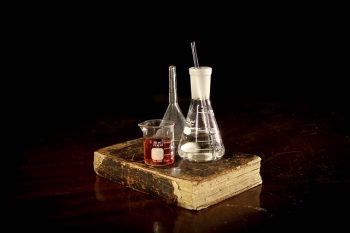Strange French Sites: Who Was Nicholas Flamel? Posted by Elizabeth Schmermund on Apr 5, 2018 in Uncategorized
If you happen to be in Paris, you might want to check out the oldest stone home in the city. Located at 51, rue de Montmerencey, it dates to 1407. But that’s not the only special thing about this house: it was built by Nicholas Flamel, the most famous French alchemist of all time.
For most of his life, Nicholas Flamel worked as a scribe and a bookseller—not too mystical. Later in his life, he built the stone house that still exists in Paris today. He died in his eighties in 1418. Most medieval historians agree that there is little evidence dating from Flamel’s life that suggests he worked in alchemy, although he may have experimented with it.
This changed in the seventeenth century, however, nearly 200 years after Flamel’s death. According to lore, Flamel was the most successful alchemist of all time–successfully creating the philosopher’s stone, which could turn base metals into gold, and then achieving immortality through drinking the “elixir of life.” This lore was “supported” by various supposed sightings throughout the seventeenth century. In fact, 200 years after his death, Flamel became a posthumous star, with references in one of Isaac Newton’s books and, later, in Victor Hugo’s The Hunchback of Notre Dame (Notre-Dame de Paris). (Flamel has also appeared in The Da Vinci Code and Harry Potter and the Sorcerer’s Stone).
Whether or not Flamel was an alchemist, it still might be worth a visit to see this ancient house. The house is now a restaurant, called the Auberge Nicholas Flamel, and so you might even stop for a meal. An inscription on the front of the house reads:
“Nous homes et femes laboureurs demourans ou porche de ceste maison qui fut faite en l’an de grâce mil quatre cens et sept somes tenus chascun en droit soy dire tous les jours une paternostre et un ave maria en priant Dieu que sa grâce face pardon aus povres pescheurs trespasses Amen.”
(“We, ploughmen and women living at the porch of this house, built in 1407, are requested to say every day an ‘Our Father’ and an ‘Ave Maria’ praying God that His grace forgive poor and dead sinners. Amen.”

Build vocabulary, practice pronunciation, and more with Transparent Language Online. Available anytime, anywhere, on any device.




